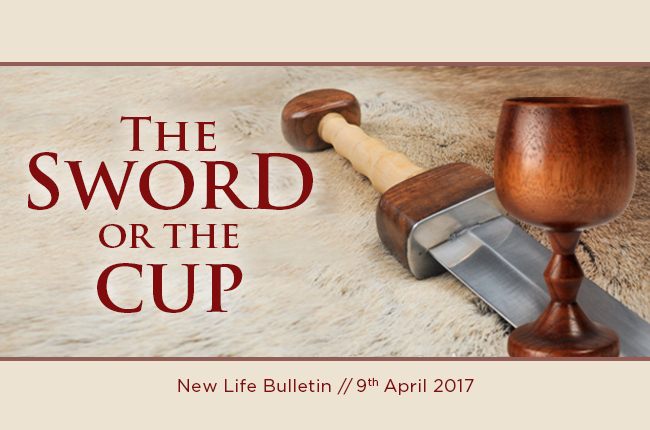The Sword or the Cup?
The Sword or the Cup?
Today we begin that most sacred of weeks in the church year--Holy week. This week marked the end of our Lord’s private ministry with His disciples and the beginning of the public drama of redemption. This was a week when man would do his worst, and God would respond with His very best. How beautifully the Apostle Paul expressed it: “Where sin abounded, grace did much more abound” (Romans 5:20).
If you follow the footsteps of Jesus during the days and hours of the last week, it is revealing to see the responses of various people to the Lord Jesus Christ. The week began with the adoring crowd at the Triumphal Entry of Sunday Later, He was betrayed by Judas and forsaken by all the disciples in the Garden. He was rejected by the religious authorities in the High Priest’s Palace and condemned in Pilate’s Judgment Hall. Finally He was both mocked and mourned as He hung on the cross.
For a few moments I want us to linger in the Garden where an epic struggle took place in prayer. We want to meditate on two symbols that still have a message for us today: the cup and the sword.
A Costly Cup – Submission
The drinking of a cup is often used in Scripture to illustrate experiencing suffering and sorrow. Jesus knew He was about to be humiliated and abused. He
would suffer shame and pain on the cross; but, even worse, He would be made sin for us and be separated from the Father. He called this solemn experience “drinking the cup.” In agony, three times He prayed: “Father, if you are willing, take this cup from Me.” His prayer always ended with those beautiful words of submission “Not my will but yours be done.”
Jesus was able to accept the cup because it was mixed by the Father and given to Him from the Father’s hand. He did not resist the Father’s will. Indeed, He came to do the Father’s will and to finish the work the Father gave Him to do.
“I delight to do your will, O my God.” (Psalm 40:8) Since the Father had mixed
and measured the contents of the cup, Jesus knew He had nothing to fear.
A Useless Sword - Rebellion
The discussion of swords had begun just hours earlier. When Jesus warned his disciples of the coming arrest, the disciples misunderstood his words and exclaimed, “See. Lord, here are two swords.” (Luke 22:36-38.) Now in the garden as they see the mob approaching, Peter rushes forward and attacks a man who turned out to be Malcius, a servant of the high priest.
Why did Peter do this? For one thing, he had to back up the boastful words he had spoken in the Upper Room “Lord I am ready to go with you …to death” (Luke 22:33). Peter had been sleeping when he should have been praying, talking when he should have been listening, and boasting when he should have been fearing. Now he was fighting when he should have been surrendering!
Peter was fighting the wrong enemy with the wrong weapon. Our enemies are not flesh and blood and they cannot be defeated with ordinary weapons (2 Corinthians 10:3-6; Ephesians 6:10-18)) While Jesus was surrendering, Peter was declaring war. Peter had a sword in his hand, but our Lord had a cup in His hand. Peter was resisting God’s will but our Saviour was accepting God’s will.
Each of us must decide: Will it be the sword or the cup? Will I resist God’s will or submit to God’s will? The cup usually involves suffering, but that suffering ultimately leads to glory. We need not fear the cup, because the Father has prepared it especially for us. He knows how much we can take, and He mixes the contents in wisdom and love. If we ask for bread, He will never give us a stone; the cup He prepares will never contain anything that will harm us. Even if we suffer pain and heartbreak, He will eventually transform that suffering into glory.
The sword or the cup? It is your choice.

